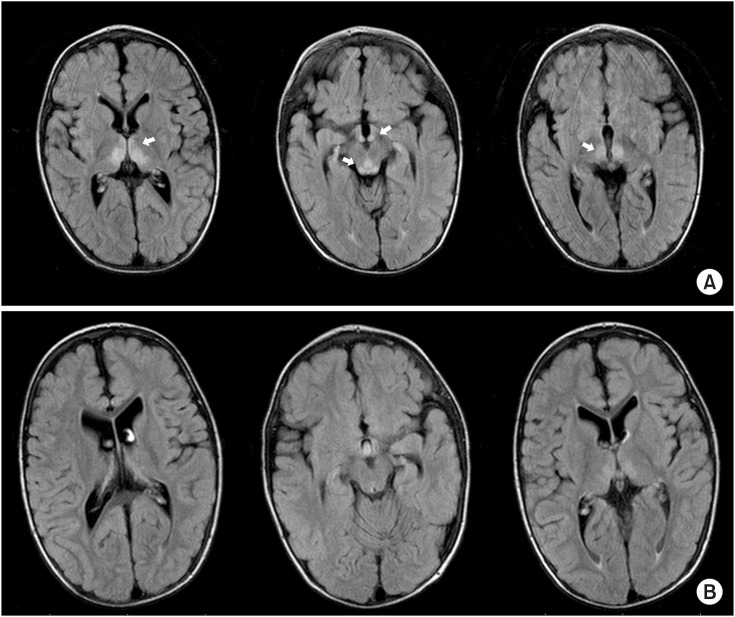Pediatr Gastroenterol Hepatol Nutr.
2019 Sep;22(5):493-499. 10.5223/pghn.2019.22.5.493.
Thiamine Deficiency in a Child with Short Bowel Syndrome and Review
- Affiliations
-
- 13rd Department of Pediatrics, Hippokration General Hospital, Thessaloniki, Greece. roilides@med.auth.gr
- KMID: 2457752
- DOI: http://doi.org/10.5223/pghn.2019.22.5.493
Abstract
- Thiamine (vitamin Bâ‚) is a water-soluble vitamin that is not endogenously synthesized in humans. It is absorbed by the small intestine, where it is activated. Its active form acts as a coenzyme in many energy pathways. We report a rare case of thiamine deficiency in a 3.5-year old boy with short bowel syndrome secondary to extensive bowel resection due to necrotizing enterocolitis during his neonatal age. The patient was parenteral nutrition-dependent since birth and had suffered from recurrent central catheter-related bloodstream infections. He developed confusion with disorientation and unsteady gait as well as profound strabismus due to bilateral paresis of the abductor muscle. Based on these and a very low thiamine level he was diagnosed and treated for Wernicke encephalopathy due to incomplete thiamine acquisition despite adequate administration. He fully recovered after thiamine administration. After 1999 eight more cases have been reported in the PubMed mostly of iatrogenic origin.
Keyword
MeSH Terms
Figure
Reference
-
1. Santarpia L, Alfonsi L, Pasanisi F, Contaldo F. Wernicke's encephalopathy in a patient with short bowel syndrome on total parenteral nutrition: a case report. E Spen Eur E J Clin Nutr Metab. 2009; 4:e245–e247.
Article2. Institute of Medicine (US) Standing Committee on the Scientific Evaluation of Dietary Reference Intakes. Institute of Medicine (US) Panel on Folate, Other B Vitamins, and Choline. Dietary reference intakes for thiamin, riboflavin, niacin, vitamin B6, folate, vitamin B12, pantothenic acid, biotin, and choline. Washington DC: National Academies Press;1998.3. Lallas M, Desai J. Wernicke encephalopathy in children and adolescents. World J Pediatr. 2014; 10:293–298. PMID: 25515801.
Article4. Zuccoli G, Siddiqui N, Bailey A, Bartoletti SC. Neuroimaging findings in pediatric Wernicke encephalopathy: a review. Neuroradiology. 2010; 52:523–529. PMID: 19844698.
Article5. Vasconcelos MM, Silva KP, Vidal G, Silva AF, Domingues RC, Berditchevsky CR. Early diagnosis of pediatric Wernicke's encephalopathy. Pediatr Neurol. 1999; 20:289–294. PMID: 10328278.
Article6. D'Aprile P, Tarantino A, Santoro N, Carella A. Wernicke's encephalopathy induced by total parenteral nutrition in patient with acute leukaemia: unusual involvement of caudate nuclei and cerebral cortex on MRI. Neuroradiology. 2000; 42:781–783. PMID: 11110087.7. Muwakkit S, Al-Aridi C, Saab R, Hourani R, Yazbeck N, Abboud M. Wernicke's encephalopathy during total parenteral nutrition in a child with acute lymphoblastic leukemia and acute pancreatitis. Neuropediatrics. 2009; 40:249–251. PMID: 20221964.
Article8. Han JW, Lim S, Shin HS, Park HJ, Jung WJ, Kwon SY, et al. Two cases of Wernicke's encephalopathy in young age patients receiving allogeneic hematopoietic stem cell transplantation. Yonsei Med J. 2012; 53:1049–1053. PMID: 22869492.
Article9. Benidir AN, Laughlin S, Ng VL. Visual disturbances in total parenteral nutrition dependent liver transplant pediatric patient. Gastroenterology. 2014; 146:e10–e11.
Article10. Arslan EA, Ekinci S, Akkuş PZ, Göçmen R, Haliloğlu G. Wernicke encephalopathy due to thiamine deficiency after surgery on a child with duodenal stenosis. Pediatr Neurol. 2014; 51:840–842. PMID: 25303868.11. Long L, Cai XD, Bao J, Wu AM, Tian Q, Lu ZQ. Total parenteral nutrition caused Wernicke's encephalopathy accompanied by wet beriberi. Am J Case Rep. 2014; 15:52–55. PMID: 24516692.
Article12. Darlington WS, Pinto N, Hecktman HM, Cohn SL, LaBelle JL. Stem cell transplant-associated Wernicke encephalopathy in a patient with high-risk neuroblastoma. Pediatr Blood Cancer. 2015; 62:2232–2234. PMID: 26174546.
Article13. Francini-Pesenti F, Brocadello F, Manara R, Santelli L, Laroni A, Caregaro L. Wernicke's syndrome during parenteral feeding: not an unusual complication. Nutrition. 2009; 25:142–146. PMID: 18929463.
Article14. Shenkin A. Basics in clinical nutrition: trace elements and vitamins in parenteral and enteral nutrition. E Spen Eur E J Clin Nutr Metab. 2008; 3:e293–e297.
Article
- Full Text Links
- Actions
-
Cited
- CITED
-
- Close
- Share
- Similar articles
-
- A Case of Short Bowel Syndrome Due to Strangulated Congenital Internal Hernia in Children
- A Case of Wernicke-Korsakoff Syndrome Associated with Hyperemesis Gravidarum
- A case of Wernicke-Korsakoff syndrome associated with severe hyperemesis gravidarum
- Sensorineural Hearing Loss and Wernicke Encephalopathy: A Case Report and Literature Review
- Experiences of Wet Beriberi and Wernicke's Encephalopathy Caused by Thiamine Deficiency in Critically Ill Patients


